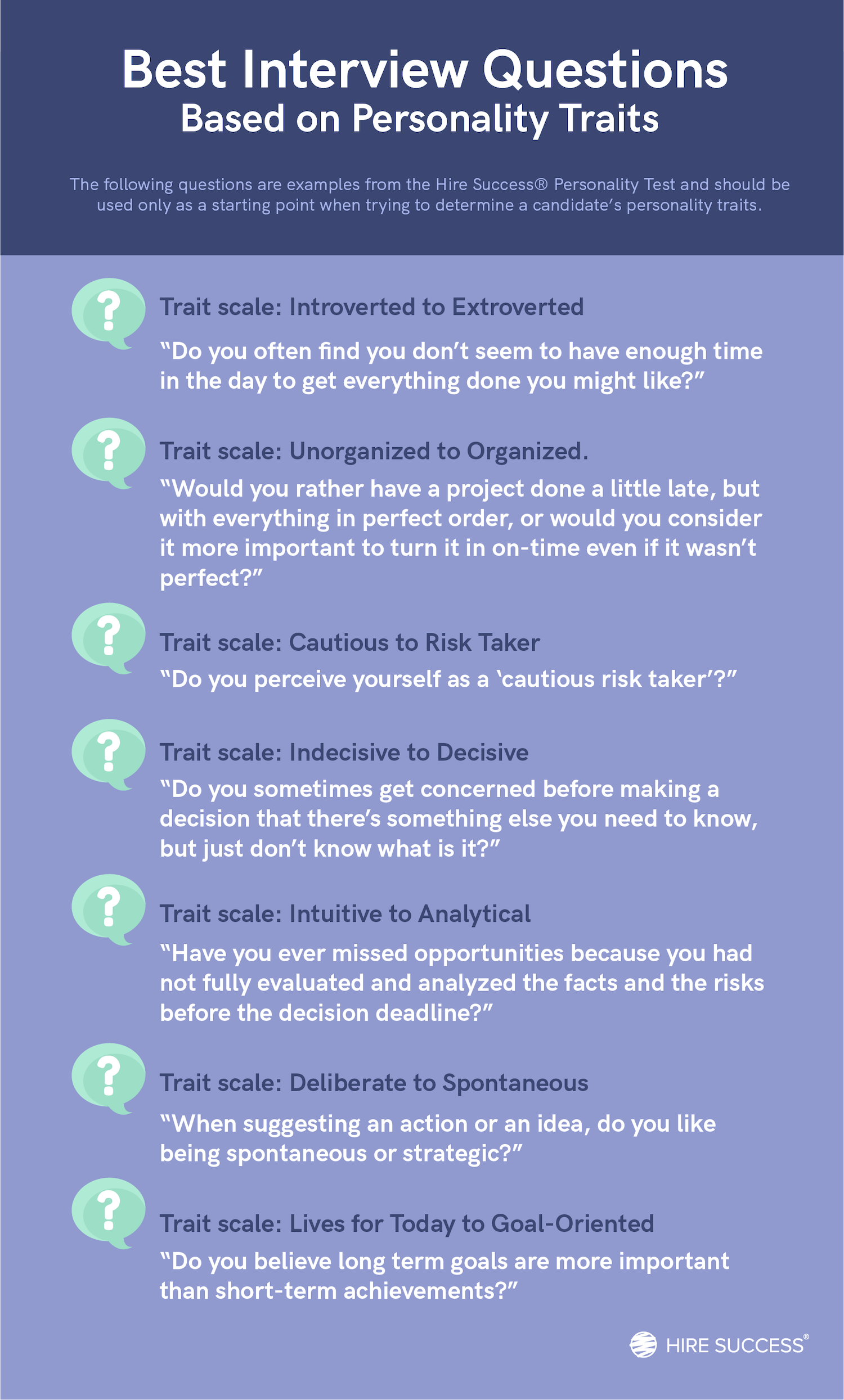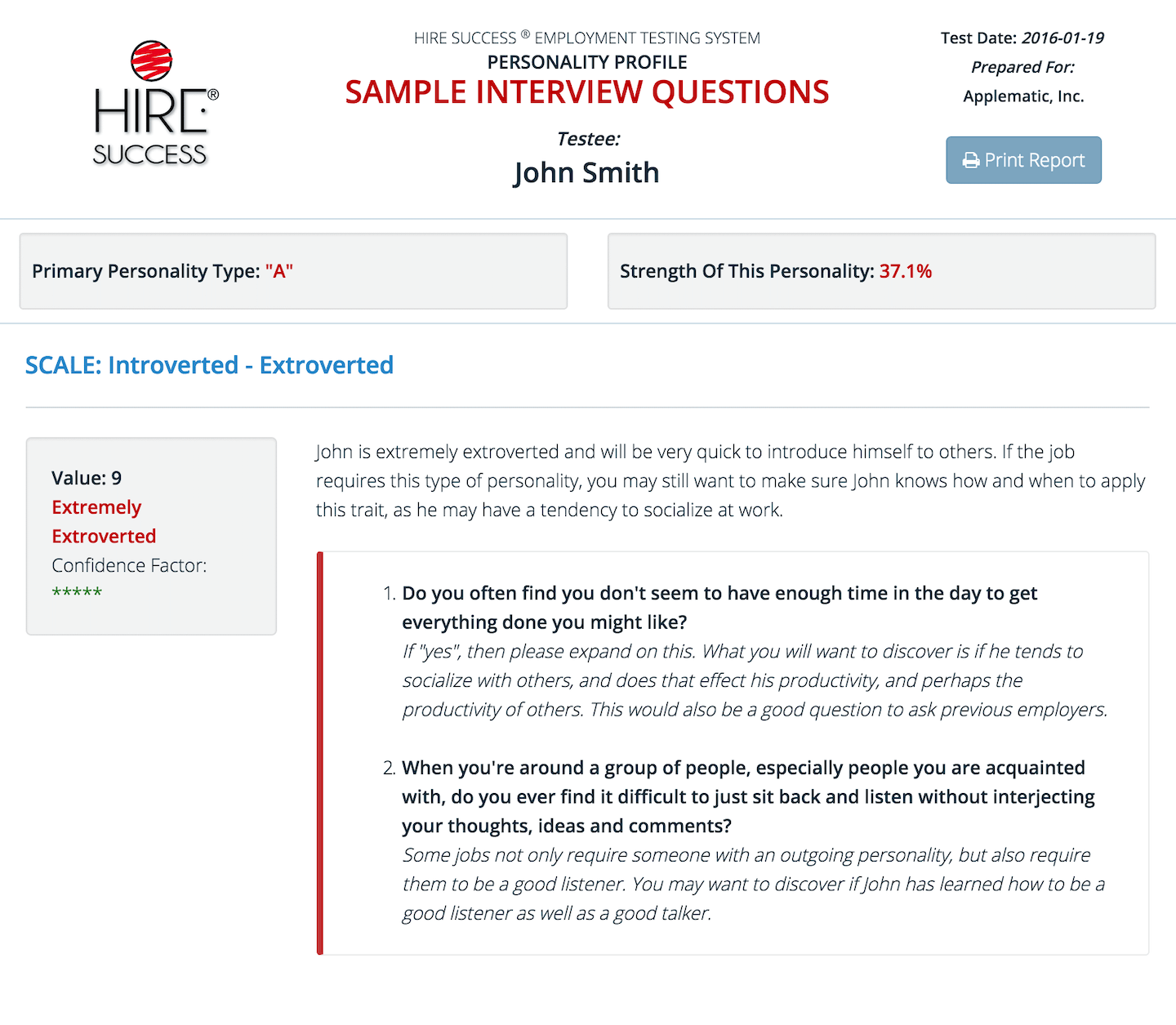An interview is usually a limited opportunity for employers to learn about an applicant well enough to make an informed, accurate hiring decision. Employers too often tell Hire Success that applicants looked great on paper and said all the right things in the interview, but it was a different story once the interviewee was on the job.
Because hiring the wrong person can be costly, it might be time for a new interview strategy with more effective interview questions for hiring managers to conduct better interviews.
How to develop and deliver effective questions to job candidates
The best interview questions let you get to know your candidate. Unfortunately, many of the most common questions asked in interviews have responses any job seeker can look up online and memorize. As a result, instead of insight into the candidate’s character, you see their acting skills.
Finding interview questions to ask that encourage candidates to think while revealing more about their character is a difficult task, but it’s worth it to see if they really are a good fit for your company.
1. Restate the job description to set expectations
Reviewing expectations in terms of duties and job goals ensures the applicant knows what the job entails. Strong candidates should be able to show they know what’s expected and articulate what they expect from you as their employer.
2. Ask about previous work projects to learn about candidates’ mindset
Ask about experiences with similar or relevant jobs. This will give the candidate an opportunity to describe what they’ve learned from previous projects.
Job applicants enthusiastic about positive events and career highlights are often exceptional workers. Answers about mistakes they’ve made in the past will reveal a sense of honesty and willingness to take responsibility. How they dealt with mistakes are valuable lessons learned only through experience.
3. Ask open-ended questions to see how candidates communicate on the spot
Avoid “yes or no” questions. The best interview questions encourage job applicants to open up and share anecdotes. This gives you a feel for their personality. If the job requires interaction, a positive personality, ability to think on the spot, and articulate problems is much needed.
More important than the delivery style, which can be learned or polished at a later date, the ability to explain a concept or solve potential problems is important.
4. Leave room for follow up questions to gauge their interest in the job
At the end of each interview, ask the applicant if they have any questions for you. The more interested in the position, the more likely they’ll have a question or two.
7 samples of effective interview questions based on traits

Some of the most common interview questions don’t reveal a lot of information about your candidate, especially if they can look online to find preferred answers. Our list of effective interview questions for hiring managers is designed to tell you a lot about a prospective employee.
Here are just a few examples of great questions, taken from the Hire Success® Personality Profile Interview Questions. However, it’s worth noting that these samples are only a starting point. Depending on the answer and the position, you'll want to continue to probe with follow-up questions in order to truly understand the candidate and their capacity to handle the role.
1. Do you often find you don’t seem to have enough time in the day to get everything done you might like?
Trait scale: Introverted to extroverted.
An introverted candidate is shy and quiet. They are not typically risk-takers. Introverts may be too shy to ask for help, which may slow down their work. However, they are generally more focused and detail-oriented. They do well in positions that require less interaction and more attention to detail.
Extroverts are outgoing and social. They will make friends quickly and be more likely to take risks. Extroverts are more likely to spend time chatting instead of working. They do well in customer-facing, sales and management positions.
Sample answer:
“I start with a prioritized list of things that need to be done, and usually finish. It’s important to me to stay on task and meet deadlines, but there have been times when I wished for more hours in the day. When that happens, I look for ways to work more efficiently.”
2. Would you rather have a project done a little late, but with everything in perfect order, or would you consider it more important to turn it in on-time even if it wasn’t perfect?
Trait scale: Unorganized to organized.
An unorganized person might need help remembering and meeting appointments or deadlines. An unorganized person might not complete all the details in a project and deadlines will usually be met with details requiring refinement.
An organized person will usually have their desk tidy and everything in its place. Work will be planned out and done systematically and in order. Sometimes a highly organized person will hyperfocus on small details instead of the big picture, causing them to miss deadlines.
Sample answer:
“That depends on the situation and project requirements. If some flexibility is acceptable, I might ask for extra time to finish - I prefer perfection. However, when faced with a hard deadline, it’s better to turn the work in, even if it still needs polishing.”
3. Do you perceive yourself as a “cautious risk taker”?
Trait scale: Cautious to risk taker.
A cautious candidate prefers to work with proven methods and avoid risks.
A risk-taker has a sense of adventure and is interested in new concepts and ideas.
Sample answer:
“A cautious risk-taker is a great description. While I’m not afraid to innovate and try new things, I am never reckless. It’s important to weigh the costs against potential benefits before moving forward.”
Say goodbye to guesswork, hire with confidence
Try our platform for free and get unbiased, data-driven insights into candidates' personal qualities and abilities.
Book a Demo Try It Free4. Do you sometimes get concerned before making a decision that there’s something else you need to know, but just don’t know what is it?
Trait scale: Indecisive to decisive.
An indecisive person struggles making decisions, especially under pressure. They may lack confidence or doubt having all dots connected enough to make an informed choice. They are heavily influenced by others and hesitate before every decision.
A decisive person will confidently make a choice and stick with it. They are unlikely to change their mind unless new and strongly persuasive information convinces them. Decisive people are valuable unless prone to rash, poorly informed decisions.
Sample answer:
“Doesn’t everyone? I find it’s better to approach decisions from a problem-solving standpoint by gathering all the available information and weighing the risks and benefits to make an informed decision. But even though it’s not always possible to know all the information, decisions are nearly always time-sensitive. My goal is to make the most informed decision I can under the circumstances — whatever comes my way.”
5. Have you ever missed opportunities because you had not fully evaluated and analyzed the facts and the risks before the decision deadline?
Trait scale: Intuitive to analytical.
An intuitive candidate often jumps to conclusions. They rely more on a “gut feeling” rather than a rational deduction. This can be useful in situations where a lot isn't known about a situation and a decision must be made quickly. On the flip side, intuitive people frequently have little patience for fact-based analysis.
An analytical candidate will not make a decision until all relevant information has been considered. They are focused and detail-oriented, which is useful in jobs that require detailed analysis. Unfortunately, this trait can lead to analysis paralysis if the person also struggles with decision-making.
Sample answer:
“While I haven’t always had time to gather all the possible information, I never make reckless or ill-informed decisions. I once had little information on a short deadline. I consulted with team members and researched a similar situation faced by another company online. It wasn’t the data preferred, but it gave me a basic foundation for consideration.”
6. When suggesting an action or an idea, do you like being spontaneous or strategic?
Trait scale: Deliberate to spontaneous.
A deliberate person likes to plan. They know why they’re taking every action and work strategically. They are brilliant public speakers when speeches are prepared and rehearsed, but may struggle to answer unexpected questions.
A spontaneous person will happily wing it. They don’t like to plan and they’ll think and act quickly. They can be unpredictable.
Sample answer:
“For the most part, I prefer to have a plan, but it depends on the circumstances. I can be spontaneous and if the situation calls for a pivot, I can roll with it. Still, a strategy is preferable in most business situations.”
7. Do you believe long term goals are more important than short-term achievements?
Trait scale: Lives for today to goal-oriented.
A candidate who prefers to live for today is carefree and doesn’t think much about the future. They prefer instant gratification and aren’t motivated by long-term goals.
A goal-oriented candidate will likely have a 5- or 10-year plan in the works. They have direction and see every day as an opportunity to get closer to their goal. They’ll be predictable, competitive and willing to make sacrifices for future benefit.
Sample answer:
“I believe both are important. Short-term achievements are often milestones on the way to long-term goals, but long-term goals are usually more important.”
Using Hire Success to create targeted questions

Both the Hire Success® Personality Profile Report and Integrity Survey Report provide sample interview questions. Check it out to get a look at the most effective interview questions to ask employee prospects. Depending on the position and what’s required, you’ll also want to have some follow-up questions prepared for candidates to make sure there aren't any hidden red flags.
In the Personality Profile Report, specific criteria will trigger questions when the system determines there’s a high probability that personality traits may best fit the job description. The ability to identify and respond to situational traits is unique to the Hire Success® System.
Each trait scale provides a range between two mutually exclusive traits, such as "introverted versus extroverted.” When an applicant’s answers indicate they have reasonably strong characteristics of both an introverted and extroverted person, interview questions are generated to help you learn why the person responded the way they did.
In most cases, you’ll find the traits on the scale dependent on the candidate’s situation or environment. The key for you as an employer is to ask effective interview questions that present reasonable job scenarios in order to learn how the person might react in those situations. The responses can help you determine whether or not an applicant is a good fit for your team.
Inconsistent answers could indicate your applicant came prepared with rehearsed answers or may be telling you what they think you want to hear. That’s why unexpected situational questions are useful.
Looking for more tips on how to find, interview, and hire the right people? Check out the Interviewer’s Guide to Hiring the Right People and try Hire Success® free.


